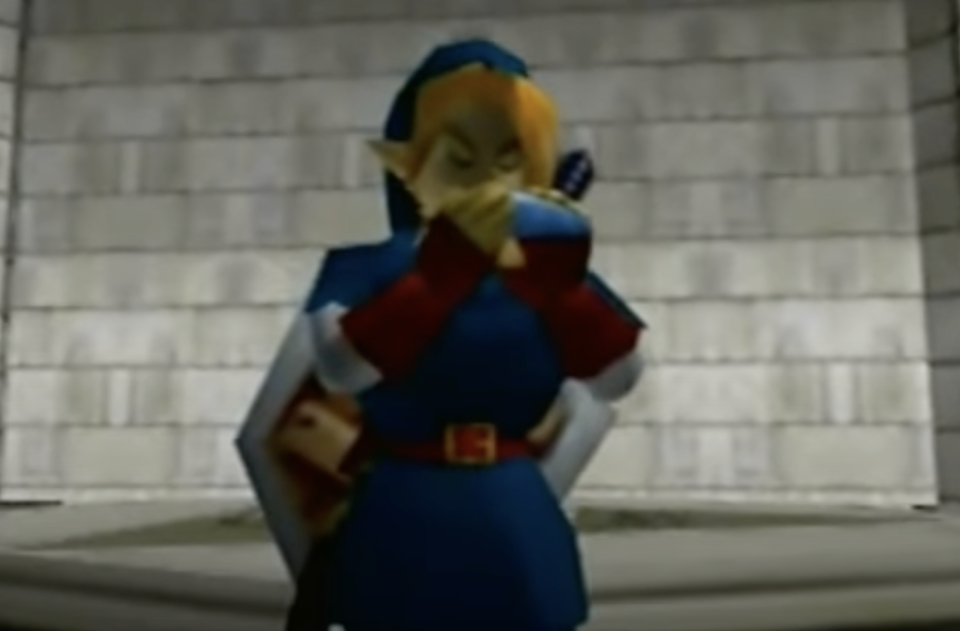'The Legend of Zelda' Is At Its Best With Young Link

If you were lucky enough to grow up with The Legend of Zelda games in the late '90s, you experienced time travel. I'm not just talking about setting the clock back in Majora's Mask. (Though that was pretty great.) I'm referring to that transcendent moment in Ocarina of Time when Young Link, only 10 years old, draws the Master Sword—and wakes up as an adult in an unwelcome future. Suddenly trapped in a grown-up body, with the world of Link’s idyllic childhood nowhere to be found? It was dizzying.
But it captured something so real, didn’t it? It’s like that line in Ferris Bueller's Day Off. “Life moves pretty fast. If you don't stop and look around once in a while, you could miss it.”
This week, Nintendo will send longtime Zelda fans like myself reeling once again with the release of Tears of the Kingdom on the Nintendo Switch. The 20th main installment in the canon, Tears is an ambitious new chapter in a franchise that has always sought to reinvent itself. Introducing wild new mechanics like vertical traversal and weapon amalgamation, Nintendo is yet again challenging our notion of what a Zelda game can be. Groundbreaking as it is, though, I can’t help but feel like something is missing.
To be honest, I’ve struggled to connect with Link for a while now. To me, The Legend of Zelda is about more than just innovative combat and perilous dungeons. It’s a coming-of-age story. Saving the kingdom is one thing. Growing up? That’s the real adventure. None of these recent games—yes, even Breath of the Wild and its teenage Link—have explored that fundamental part of the mythology. Nintendo, I humbly ask: Where is Young Link?
The last time we saw pointy head (or tail) of the boy-aged Link was in 2002's Wind Waker. (Unless we’re counting some of the lesser handheld entries–I have yet to meet someone who’s actually played through Phantom Hourglass.) In Wind Waker, Link lives on a charming tropical island with his grandmother, far away from the burden of Hyrule, Princess Zelda, or the evil king Ganon. That is, until his future flies onto the shore one day and steals his youth away. Yes, destiny quite literally arrives at his doorstep in that game. Wouldn’t you know it, he’s already dressed for the occasion in his green pajamas.
Legend calls for Link in Wind Waker, just as it does in all the games. But since he’s a child in this one, the conflict isn't so simple. Yes, he has to rescue the kingdom of Hyrule (ahem, Outset Island and the Great Sea). But he also has a much more nuanced challenge to confront: How do you accept the responsibilities of adulthood when you're not yet finished being a kid? Questions like these fill Zelda games with meaning and power. Boy, do they make them relatable, too.
In Majora's Mask, things are a little less subtle. Stranded in a strange realm far away from home, the world is quite literally ending all around you, and you’re the only one who can stop it. So not only are you burdened with a task that’s beyond your means, but you’re also trapped outside your comfort zone–and your childhood is suddenly little more than a memory of a dream. Sound familiar?

For me, it all comes back to that moment in Ocarina. Unlike Wind Waker and Majora, the first Zelda game in 3D spans both childhood and adulthood, and the transition between those stages of life sticks with you, long after you've put down the controller. After battling through forest, fire, and water as child, you've done all you can to prevent a great evil force from devastating the kingdom. You enter the sacred realm, raise the sword... but out of nowhere, you're transported seven years into the future. You step outside, into the castle’s once-charming courtyard—only to find it replaced with a desolate sprawl of zombies and a dark, moaning wind. It's terrifying.
In Ocarina, you learn firsthand that your story doesn't end when you reach adulthood. In fact, the toughest challenges—Water Temple, taxes, etc.—are yet to come. This isn’t to say that Zelda games need to be about one thing. From the very start, the franchise has been a celebration of the creative freedom that the medium can offer. I’m not arguing that they need to be a bummer, either–of course, you always vanquish Ganon in the end.
But Nintendo's legendary fantasy series has always been the peak of the video game medium. Each title has been massively influential. So the studio ought to tell stories that are as complex as they are exciting. For me, the experience of growing up with Young Link is as fundamental to Zelda as Deku Nuts and Fire Arrows. Nintendo needs to wake him up. As the Great Deku Tree says, "It seems the time has come for the boy without a fairy to begin his journey..."
You Might Also Like

